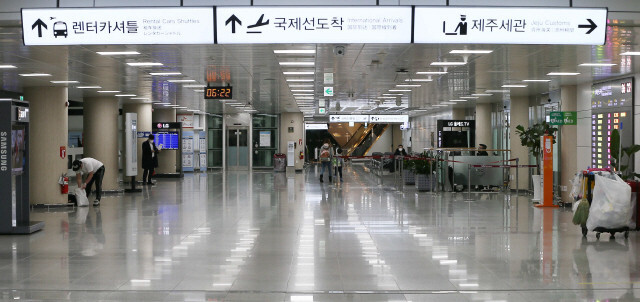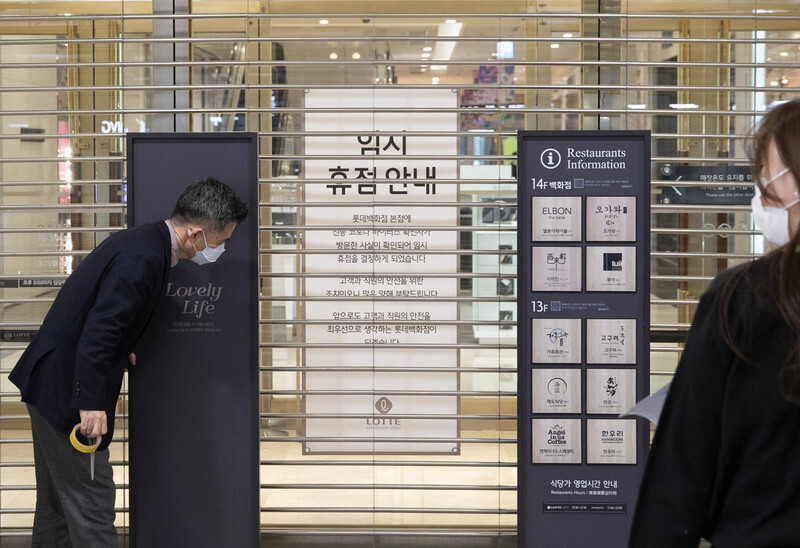hankyoreh
Links to other country sites 다른 나라 사이트 링크
[Reporter’s notebook] The thin line between caution and xenophobia

The South Korean government decided to bar entry as of Feb. 4 to all foreign nationals who have visited or stayed in China’s Hubei Province in the last 14 days. Entry is being restricted for Chinese nationals with passports issued in Hubei, and the validity of current visas issued by the South Korean Consulate General in Wuhan is being temporarily suspended. When purchasing airline tickets, consumers are being asked whether they have visited Hubei; their claims are confirmed once again by quarantine authorities at the time of entry. If a foreign national is subsequently found to have lied, he or she is to be forcibly deported.
It’s unprecedented to see a ban on all entries by visitors from a particular region due to an infectious disease. Some have suggested that even this three-stage system is worrying. Over 680,000 people have signed on to a citizens’ petition calling to bar entry to Chinese nationals outright rather than restricting the ban to a particular region. Why did the government restrict its entry ban measures to visitors from a particular region? Don’t measures like this exacerbate xenophobia toward Chinese people?
I work on the social policy team covering the novel coronavirus outbreak. I applied for the Ministry of Health and Welfare beat last month, and the first South Korean coronavirus case was confirmed a week later, so it’s been quite the baptism by fire. What with following the different twists and turns throughout the day and looking up obscure public health and medical terminology, it feels like learning the alphabet all over again.
I imagine many of our readers feel scared and anxious reading about the rapidly growing numbers of novel coronavirus infections and deaths in China. With some infection cases recently confirmed after the patient entered from a Southeast Asian country like Thailand or Singapore, some of you may think that we need more stringent entry control measures.

The long and short of it is that the government’s response has remained circumspect. On Feb. 6, Minister of Foreign Affairs Kang Kyung-wha was asked whether the administration was weighing an expansion of the regions subject to entry bans for foreign nationals. “We are continuing to monitor the situation, taking into consideration factors such as the spread of infections in China and overseas, and the disease control response efforts in South Korea and overseas,” she replied, adding that “additional measures will be considered if necessary.”
International organizations, for their part, are not recommending entry bans. The WHO declared a “public health emergency of international concern” (PHEIC) on Jan. 30, but expressed its opposition to restricting international movements and trade. The International Health Regulations, an agreement to which South Korea is a party, states that infection control measures should “avoid unnecessary interference with international traffic.”
Amid this climate, things took a sudden turn around last weekend. Not only are South Koreans feeling increasingly uneasy about the rapid rise in the number of confirmed infections here, but with the US, Japan, and other countries all announcing their own entry restriction measures, the government was put in the position of having to examine additional measures.
At the same time, we can see evidence of the government’s efforts to not give the appearance that the measures apply to all Chinese nationals. In announcing them on Feb. 2, Minister of Health and Welfare Park Neung-hoo stressed that entry would be restricted for “all foreign nationals entering from Hubei Province, where the novel coronavirus spread has been most severe [rather than Chinese nationals as a whole]” until “such time as the infection introduction risk improves.” This decision appears to have been based on the fact that barring entry to all Chinese visitors based on nationality would not only risk diplomatic and economic frictions with China, but also potentially be in violation of international human rights norms.
Restaurants banning Chinese customers; protesters calling for all-out entry banNevertheless, the increase in xenophobia is concerning.
Some restaurants in South Korea have put up posters banning Chinese customers, and some protesters have even been calling for an entry ban on all Chinese nationals. But Korea isn’t the only place where this is happening. There have been incidents of verbal abuse, and even physical violence, directed at not only Chinese but also other Asians in other countries.
One opinion about whether the entry ban constitutes an infringement of human rights was offered by Kim Won-yeong, an attorney. “If people are calling for entry to be barred for everyone, regardless of nationality, who is in Hubei Province, where the coronavirus is raging, or even throughout China, it’s not clear if that constitutes xenophobia,” Kim said.
According to Kim, such measures don’t “exclude all members of a group with [particular] characteristics,” but are rather based on “the fact of their presence at a specific time and place.” To some extent, Kim says, there are logical grounds for such a ban. But Kim stresses that, if the ban goes too far and “people face a negative stigma for the rest of their lives, even after the virus has completely subsided, simply because they’re from Wuhan, that would clearly represent xenophobia.”
While it’s completely natural to feel anxiety about a new infectious disease, I hope people will remember that the object of their fear is not the Chinese but the virus itself, and that infected people are also victims of the disease.
At any rate, let’s all be sure to wash our hands!
By Park Da-hae, staff reporter
Please direct comments or questions to [english@hani.co.kr]

Editorial・opinion
![[Column] Welcome to the president’s pity party [Column] Welcome to the president’s pity party](https://flexible.img.hani.co.kr/flexible/normal/500/300/imgdb/original/2024/0515/3917157400447943.jpg) [Column] Welcome to the president’s pity party
[Column] Welcome to the president’s pity party![[Editorial] Korea must respond firmly to Japan’s attempt to usurp Line [Editorial] Korea must respond firmly to Japan’s attempt to usurp Line](https://flexible.img.hani.co.kr/flexible/normal/500/300/imgdb/original/2024/0514/2317156736305813.jpg) [Editorial] Korea must respond firmly to Japan’s attempt to usurp Line
[Editorial] Korea must respond firmly to Japan’s attempt to usurp Line- [Editorial] Transfers of prosecutors investigating Korea’s first lady send chilling message
- [Column] Will Seoul’s ties with Moscow really recover on their own?
- [Column] Samsung’s ‘lost decade’ and Lee Jae-yong’s mismatched chopsticks
- [Correspondent’s column] The real reason the US is worried about Chinese ‘overcapacity’
- [Editorial] Yoon’s gesture at communication only highlights his reluctance to change
- [Editorial] Perilous stakes of Trump’s rhetoric around US troop pullout from Korea
- [Guest essay] Preventing Korean Peninsula from becoming front line of new cold war
- [Column] The state is back — but is it in business?
Most viewed articles
- 1[Column] Welcome to the president’s pity party
- 2[Editorial] Transfers of prosecutors investigating Korea’s first lady send chilling message
- 3Unexpected rate of AI development requires timely discussion of side effects
- 4[Editorial] Korea must respond firmly to Japan’s attempt to usurp Line
- 5Could Korea’s Naver lose control of Line to Japan?
- 6US has always pulled troops from Korea unilaterally — is Yoon prepared for it to happen again?
- 7Major personnel shuffle reassigns prosecutors leading investigations into Korea’s first lady
- 8Nuclear South Korea? The hidden implication of hints at US troop withdrawal
- 9Second suspect nabbed for gruesome murder of Korean in Thailand, 1 remains at large
- 10Korea cedes No. 1 spot in overall shipbuilding competitiveness to China